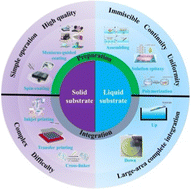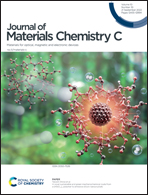The future of solution processing toward organic semiconductor devices: a substrate and integration perspective
Abstract
π-Conjugated organic semiconductors (OSCs) are the basic scaffold of organic semiconductor devices. Solution processing is an effective way to promote the industrialization of OSCs. The cost-effective and room-temperature compatibility advantages of the solution process are the basis for high-throughput printed electronic devices. Because OSCs usually exist in devices in the form of thin films, researchers have developed a large number of thin film preparation techniques based on solution processing. The past two decades have seen great progress in the improvement of conventional solution processing techniques and the development of new solution processing methods. However, there are still no mature and systematic industrial processing techniques just like that in the silicon-based semiconductor industry, which is why most of the current research work on organic semiconductors still remains in the laboratory stage. Given the many developed solution processing methods, which one is the most promising to promote organic semiconductor materials from laboratory research to industrial applications? Trying to answer this question, this review summarizes various film preparation methods and their advantages and disadvantages from a new perspective of the physical state of the film-forming substrates and integration methods. By analyzing the process characteristics and summarizing the corresponding assembly strategies, we want to present to the reader the evolution of solution processing methods for organic electronic devices. Finally, insights and opportunities were put forward to promote further research in this field.

- This article is part of the themed collections: Journal of Materials Chemistry C Recent Review Articles and Journal of Materials Chemistry C HOT Papers


 Please wait while we load your content...
Please wait while we load your content...